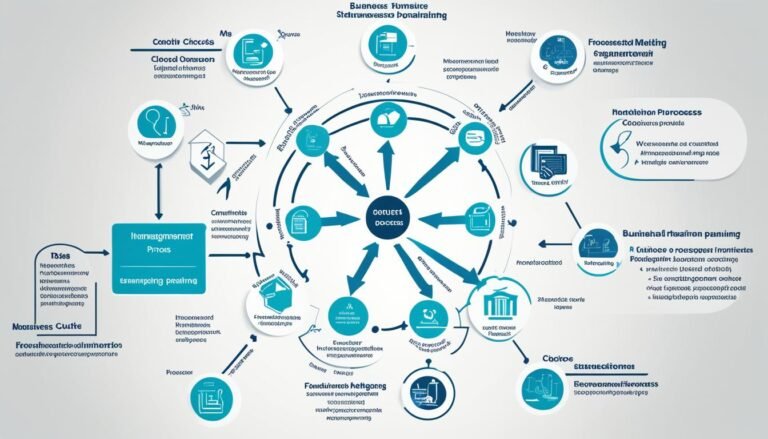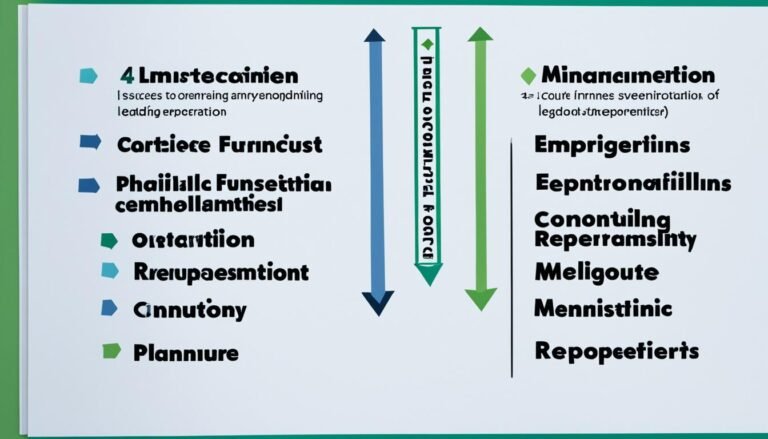What role does a manager play in team development?
Managers are super important. They influence 70% of how much workers care about their jobs. The success of a team mainly depends on its manager. This is because they help people work well together.
Managers encourage working together and talking openly. They also make sure everyone knows what’s expected and keep the work environment positive. Their efforts help the team work effectively.
Let’s talk more about the role of managers in making a team great. We will cover how they lead and what they’re responsible for. Also, how they shape how the team behaves together.
We’ll look into the big need for good communication skills too. And we’ll share tips on how to make a strong team culture happen. Training and development led by managers are crucial. They help a lot in team learning. This article is useful for all managers wanting to grow or anyone thinking about leading teams well.
Key Takeaways:
- A manager’s role in team development is crucial, accounting for 70% of the variance in employee engagement.
- Managers play a significant role in fostering teamwork and collaboration within a team.
- They have a direct impact on team dynamics and can build a strong team culture.
- Effective communication skills are essential for managers in team development.
- Managers can create a learning culture, set training and performance goals, and provide on-the-job practice for team members.
The Importance of Managers in Teamwork and Collaboration
Managers are key to making teamwork and collaboration work. They use effective methods that help team members work well together. This means they can reach their goals together. Good managers make sure teams work smoothly and deliver great results.
Creating a culture of recognition, personal growth, and open talks is important. Team members need to feel valued and know their ideas are heard. This makes them work together better and helps the team succeed.
The Role of Expectations and Resources
Managers must ensure everyone knows what’s expected of them. This clarity in roles helps guide the team’s work together. It aligns their efforts with the team’s goals.
Also, managers aid by making sure the team has what they need. They offer tools, training, and support to help the team excel. With the right resources, teamwork improves and members can achieve great things.
Creating an Environment for Successful Teamwork
Creating the right team environment is also up to managers. They build trust and encourage working closely together. This paves the way for effective teamwork.
Managers don’t just manage; they also help the team bond. Through team activities and trust-building, a strong team forms. This kind of team not only works better but also finds creative solutions and generates new ideas. This boosts the team’s overall success.
The Benefits of Effective Management
Good management improves how a team works together significantly. It boosts engagement, motivation, and satisfaction at work. This leads to better productivity, smarter choices, and a happy work environment.
| Benefits of Effective Management in Teamwork and Collaboration |
|---|
| Improved communication and information sharing |
| Enhanced problem-solving and decision-making capabilities |
| Higher employee engagement and job satisfaction |
| Increased creativity and innovation |
| Greater productivity and efficiency |
| Positive work culture and higher employee retention |
Managers are vital for success through teamwork. They create a space where collaboration thrives, set goals clearly, and provide support. This empowers the team to achieve outstanding results.
The Impact of Managers on Team Dynamics
Managers are key in shaping how a team functions. They build a positive team spirit. This makes working together better and helps get the job done greater.
Good team dynamics come from open talks, trust, and respect. It’s the manager’s job to make sure these qualities grow. They do this by making everyone feel their ideas matter and are worth something.
Open talks between team members lead to better problem-solving. A manager must encourage this. It helps the team work well together.
Building trust is crucial too. Managers trust their team to do their job well, and this helps team members trust each other. It makes a strong, trusting team.
“The strength of the team is each individual member, and the strength of each member is the team.” – Phil Jackson
Respect is vital for a team to succeed. Managers lead by example, showing respect to all. This encourages the team to work well together.
Managers also create a culture that is enjoyable to work in. This is where everyone supports each other and aims for the same goals. It makes working together feel enriching and rewarding.
Good management and leadership are key. Managers need to be clear and appreciate everyone’s work. This makes the team strong and effective.
Building a Strong Team Culture: Tips for Managers
To make a strong team spirit, managers can:
- Encourage sharing and open talks. Make sure everyone gets to say their piece.
- Show the behaviors you want in your team. Be respectful, honest, and professional.
- Find ways for the team to work together. This could be group projects or brainstorming. Make sure to highlight the value of working together.
- Create a safe space. Team members should feel fine to share risky ideas or be vulnerable without fear of judgment.
- Applaud wins, big or small. Recognize and cheer for the team’s efforts.
- Help the team grow. Offer training and support their career development.
By using these tips, managers can make a real difference. They’ll create a team that is innovative, collaborative, and highly productive.
Manager Communication Skills in Team Development
Good communication is key for a team to succeed. Managers who can talk well make their teams work together better. They create an open and friendly work space.
Managers must be clear about what they want from their teams. Giving everyone clear and short directions helps. This ensures that each member knows what they need to do. It lays a strong base for teamwork.
Managers need to be good at giving helpful feedback too. Regular talks about how the team is doing help a lot. They can point out what’s going well, where things could be better, and how to improve. This keeps the team growing and moving forward.
Encouraging the team to talk openly is also crucial. This builds a place where everyone feels safe to share their thoughts. By promoting this kind of talk, managers help their teams get creative, solve problems, and come up with new ideas easily.
Managers build better relationships with their teams through good communication. Listening carefully and understanding how the team feels is important. Doing this helps managers make strong, trusting, and friendly relations with their teams. This makes the team work better together.
“Effective communication is not just about speaking; it is about listening, understanding, and responding. Managers who excel at communication are able to connect with their team members on a deeper level, leading to improved performance and overall team success.”
Being good at communication helps managers solve team conflicts too. Dealing with fights quickly and clearly stops small problems from getting worse. This makes the team happier and more productive.
In the end, being a great communicator is vital for any team leader. Clearly laying out expectations, giving good feedback, encouraging talks, and building trust matter a lot. It all makes the team work better and more happily. It’s key to making a team a great place to be.
Strategies for Building a Strong Team Culture
Building a strong team culture is key for successful team growth. It boosts team performance through strong management. A solid team culture encourages trust, working together, and feeling part of something. This makes everyone feel their work is important and motivates them to do their best.
Managers are central to creating a strong team culture. They do this by sharing common values and goals with the team. This brings everyone together. They also promote open talks where team members can share their thoughts, issues, and ideas. This creates a transparent and problem-solving culture.
“A strong team culture is a foundation for high levels of teamwork, employee engagement, and productivity.” – John Maxwell
Team-building activities are vital for a strong team culture. These can be events, offsite meetings, or online gatherings. They help team members get to know each other outside work. This helps build strong bonds, leading to better work together.
Recognizing team members’ hard work is critical too. Appreciating them and celebrating their success makes the team positive and united. This can be through rewards, public acknowledgment, or a simple thank-you. This lifts everyone’s spirits and motivates them.
5 Key Strategies for Building a Strong Team Culture:
- Create a shared vision and set clear expectations that reflect the team’s values and goals.
- Promote open communication and constructive feedback among team members.
- Organize team-building activities and encourage relationship building.
- Recognize and appreciate individual and team achievements.
- Lead by example and demonstrate the desired team culture through actions and behaviors.
Building a strong team culture needs ongoing commitment from managers. It means investing in team growth and choosing strong leadership. This environment helps team members flourish, boosting performance and success for everyone.
| Benefits of Building a Strong Team Culture: | Impact on Team Performance: |
|---|---|
| Enhanced collaboration | Increased productivity |
| Improved communication | Higher employee engagement |
| Greater trust and cooperation | Better problem-solving capabilities |
| Reduced conflicts and misunderstandings | Improved retention and job satisfaction |
The Role of Managers in Team Training and Development
Managers are key to training and developing their teams. They focus on building effective team strategies through skill development. While trainers help with learning, managers offer insights into each team member’s abilities. They play a vital role in how training impacts the team. Here are key ways managers help their teams grow:
1. Setting Personal Learning Objectives
Managers know their team’s strengths well. They set personal goals to help team members grow. These goals match individual skills with team needs. This tailored approach boosts team engagement and learning.
2. Providing Support During Training
Support from managers makes learning better. They give advice and resources to navigate training. Their presence ensures team members are motivated and supported throughout learning.
3. Applying Learned Skills to Jobs
Managers help apply new skills at work. They provide feedback and chances to practice what was learned. This ensures training adds real value to the team’s work.
4. Aligning Training with Team Goals and Needs
Managers connect training to the team’s missions and challenges. They make sure training meets what the team needs to improve. This approach boosts both individual skills and team success.
5. Fostering a Learning Culture
Creating a culture of learning is critical. Managers lead by valuing ongoing development. They encourage sharing knowledge and helping each other grow. A team that values learning also boosts its own performance and is more innovative.
Managers have a big role in team growth, especially in training and development. They make sure training is focused and relevant to the team’s needs. By being hands-on, managers push their teams towards success. They guide, support, and make sure training helps the whole team reach its goals.
The Benefits of Manager Involvement in Training
Managers are vital in developing their teams through training. They understand what each team member needs to grow. This ensures training fits everyone’s needs.
Managers do more than just set up training. They support it by guiding and coaching team members. Their feedback helps apply lessons in real life.
Managers being actively involved creates a culture of learning. Seeing them take part motivates team members to learn and grow. It boosts everyone’s accountability for their own progress.
This involvement also changes how teams work together. Managers can influence how their team communicates and cooperates. This can make teamwork and communication stronger, improving overall team performance.
Benefits of Manager Involvement in Training:
- Deeper understanding of employees’ skills and development needs
- Tailored training programs based on specific requirements
- Ongoing guidance and coaching
- Creation of a culture of learning and development
- Fostered sense of ownership and accountability among team members
- Reinforcement of teamwork and effective communication
- Positive impact on team dynamics and overall performance

Having managers involved in training benefits everyone. It shows how important team growth is. Plus, it uses their impact on team culture, leading to a more effective team.
Creating a Learning Culture Through Manager Example
Managers are key in developing a team’s spirit by promoting teamwork, collaboration, and good communication. They strive to form a culture where learning and growing professionally is highly prized.
They lead the way, inspiring and pushing team members to boost their skills through learning activities. Managers show they care by backing training and development programs, highlighting lifelong learning.
Building a strong learning culture starts at the top, with managers showing their commitment to self-improvement. They put in time and effort to improve their skills, setting an inspiring example. This encourages team members to follow suit and strive for personal development.
Managers enhance teamwork and collaboration by openly communicating and sharing knowledge. They ask team members to share their learning and experiences. This not only boosts individual learning but also helps in creating a strong sense of togetherness and mutual help among the team.
Creating a safe place where team members can freely ask, seek guidance, and share ideas is crucial. Managers should work towards building an environment focused on trust and respect. This paves the way for open conversations and innovative ideas, leading to better team performance.
To strengthen a learning-based environment, managers offer resources like books, online classes, or workshops. They pick resources that match the team’s goals and each member’s personal development needs. This shows how dedicated they are to bringing about the growth and success of their teams.
By being examples of continuous learning, managers give their teams the power to manage their own professional growth. This not only leads to better team success but also cultivates a work culture that’s vibrant and engaging. Such teams are high-performing and have a positive work environment.
| Benefits of Creating a Learning Culture Through Manager Example |
|---|
| 1. Increased employee engagement and motivation |
| 2. Enhanced team collaboration and problem-solving skills |
| 3. Improved retention and talent development |
| 4. Cultivation of a positive work environment |
| 5. Accelerated personal and professional growth |
The Manager’s Role in Recognizing Training Importance
Managers play a key role in seeing their teams grow. They do this by talking clearly about the need for training and development. They make sure their team members know they’re appreciated when they improve.
Good management is crucial. Talking about why training matters helps the team understand its benefits. Managers show they care about ongoing learning and getting better.
Managers should give time for training. This shows they’re serious about their team’s success. It makes training a vital part of growing together.
“Training is an investment in our team’s success. By dedicating time for learning and development, we are ensuring that our team members have the skills and knowledge they need to excel in their roles.”
It’s also important to celebrate when team members improve. This pushes them to keep learning. It helps everyone see that growing is valuable.
Managers connect training to team and company goals. Showing how training fits the big picture motivates everyone. It makes learning more meaningful.
Recognizing these steps shows how much managers care about their team’s growth. They encourage everyone to learn and grow always.
Next, let’s explore the strategies managers can use to provide opportunities for on-the-job practice and develop training and performance goals.
Providing Opportunities for On-the-Job Practice
Effective team building involves giving team members chances to practice what they learn. It allows them to use new knowledge and skills in their daily work.
Managers help by giving team members relevant tasks, roles to act out, or online scenarios to work through. This makes learning practical and gives team members real experience.
It’s essential for managers to support their teams during practice. They should give feedback, praise efforts, and encourage using new skills. This helps team members learn better and keeps them improving.
Practicing at work boosts confidence and key skills like problem-solving and decision-making. Team members learn to be adaptable in various situations.
Emphasizing practice enhances a team’s culture of always learning. Team members get excited about new challenges and grow both personally and professionally.
“Practice is not the application of theory; it is the emergence of theory.”
– Chris Argyris
On-the-job practice is vital for team development. It ensures skills are not just learned but are also used and improved in real work situations. This leads to better team performance and success.
Example of On-the-Job Practice:
Imagine a team that has just learned better ways of customer service. The manager might:
- Have them work with real customers to use their new skills and get feedback.
- Do role-plays where they act out customer service situations to practice different approaches.
- Use online modules to practice handling customer scenarios, providing a safe learning environment.
Through such practice, team members get better at offering great customer service. They understand how to apply their training in real situations. This leads to happier customers and a stronger team.
Setting Training and Performance Goals
A key part of managing a team is setting goals for growth and success. Managers work with their team to identify what skills and knowledge they need. This helps team members know what’s expected and how to get there. It improves how the team works together and helps each person grow.
The Benefits of Setting Training and Performance Goals
Setting clear goals boosts not just the team but also each member. Goals should be aligned with the bigger team’s goals, giving everyone a sense of direction. Achievable goals let employees see their progress, which keeps them motivated. They know what they’re working towards and why.
“Setting goals is the first step in turning the invisible into the visible.”
– Tony Robbins
Specific goals that you can measure help you see how each team member is doing. Managers can then give feedback based on real progress. This process helps find where people can improve. It also motivates continuous learning. Employees are more likely to learn new things if it helps them meet their goals.
Effective Strategies for Goal Setting
There are good ways for managers to set team goals:
- Alignment with team objectives: Make sure individual goals help the whole team move forward.
- SMART goals: Goals must be Specific, Measurable, Achievable, Relevant, and Time-bound. This helps everyone stay on track.
- Collaborative goal setting: Letting team members help set their own goals makes people more committed. It also gives them a feeling of control.
- Regular review and feedback: Managers need to check in on progress and offer feedback. This keeps goals updated and everyone supported.
Remember: Goal setting is an ongoing process. Goals should adapt as the team and its needs change. By keeping goals alive, managers can keep their team motivated and impactful.
Investing time in setting these goals pays off. It’s a big part of making sure the team does well. Clear goals show the way to success. They also make sure everyone is putting their best into the team.
Conclusion
Managers are key in team growth, leading and managing while building effective strategies. They build a positive team culture and encourage working together. Managers recognize each member’s strengths and make sure everyone understands what’s going on.
They also back up training and development, letting team members learn and grow. With these steps, managers help reach the company’s goals and make their teams successful.
FAQ
What role does a manager play in team development?
Managers are key in building teamwork. They encourage a work environment that supports teaming up and sharing ideas. This boosts growth, both personal and job-related, for team members.
How do managers impact team dynamics?
Managers shape how a team works together. The way they lead influences team culture. By fostering an open and welcoming space, they help team members get along and achieve goals together.
What are the key communication skills for managers in team development?
Effective communication is a must for managers. They should clearly lay out goals, give feedback, and help team members talk to each other. This keeps everyone on the same page and builds a strong team spirit.
How can managers build a strong team culture?
Strong team cultures start with trust and mutual respect. Managers ensure everyone feels they belong. They also push for the same team goals and help the team socialize and grow together.
What is the role of managers in team training and development?
Managers play a big part in their team’s training. They know their team’s strengths and what they need to learn. This helps the team get better and use new skills effectively.
What are the benefits of manager involvement in training?
When managers are closely involved in training, it meets the team’s specific needs. They understand their team better. They can also guide their team even after training, helping them use their new skills well.
How can managers create a learning culture within the team?
They should lead the way in valuing learning. Encouraging staff to share knowledge and keep growing is crucial. This sets a tone where everyone strives to do better every day.
How should managers communicate the importance of training and development to their team?
Managers show they value training by making time for it. They celebrate when staff get better at their jobs and connect training to the team’s success. This shows the importance of learning.
How can managers provide opportunities for on-the-job practice?
Managers offer chances to practice skills on the job. They may assign specific tasks or provide online learning activities. They guide employees through, praising the use of new abilities.
What is the manager’s role in setting training and performance goals?
Managers team up with employees to set goals. These goals push the team to do better and grow. By working together, they map the path to success.
What is the importance of managers in team development?
Managers are vital in making a team work well together. They foster a culture where everyone supports each other and does their best. This leads to improved teamwork and more opportunities to learn and grow.








